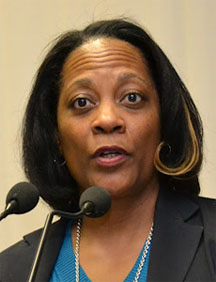This year is shaping up to be the deadliest ever for journalists with 72 killed so far for 2012, the opening of the International Press Institute (IPI) Congress was told on Sunday in Trinidad.
Delivering her report on the state of press freedom worldwide, IPI executive director Alison Bethel McKenzie said the highest number of deaths so far has been in uprising-ravaged Syria but she also highlighted the dire situation in Mexico where journalist killings have led to some outlets declaring that they would no longer cover the drug-fuelled crime rampage. In 2011, 102 journalists were killed. The highest number of deaths recorded by the IPI since it began keeping count was 110 in 2009.
Speaking on the opening day of the congress at the Hyatt Regency Hotel in Port-of-Spain, McKenzie said it was deeply disturbing that in a year so “massively dominated” by the Arab Spring and its demands for greater freedoms that so many journalists could be killed. She described Syria as the “most lethal country in the world” for journalists with 20 having been killed.

The third deadliest region in the world for journalists is Latin America with 14 killed so far and with Mexico at the “head of the pack”. Six reporters have been killed so far in Mexico all in the space of 50 days. McKenzie was overcome with emotion as she related the case of a female journalist who was found beaten and strangled to death on April 29. The Vera Cruz journalist had been working for a weekly paper which was a leading source of information on organized crime, drug trafficking and drug-related violence and McKenzie, struggling to contain her tears and dabbing her eyes, said that before her death she had been working on a story about the arrest of nine policemen for suspected links with drug cartels.
On world press freedom day in May, the dismembered bodies of three journalists were found wrapped in plastic and dumped in a waste water canal. “So chilling and persistently deadly is the climate for reporters in Mexico that many outlets have announced that they will stop covering crime all together.”
She also pointed to murders in Honduras and Brazil and said that Ecuador has seen a deterioration of the press freedom situation. She said that Quito appeared to be following the cue of Venezuela where the press freedom situation is continuing to deteriorate.
In the Caribbean, one reporter was killed in Haiti and McKenzie noted that repression continues in Cuba. She noted that criminal defamation laws continued to be of concern in the region and that IPI had just concluded a mission to Barbados, the Dominican Republic, Jamaica and Trinidad and Tobago.
Earlier in the proceedings, the President of Trinidad and Tobago George Maxwell Richards, in light of the growing violence against journalists had raised the idea that there could be some form of internationally recognized immunity for them akin to the status of agencies such as the Red Cross. Noting that one of the topics at the three-day conference is ‘Following the Money Trail – Covering Organised Crime and Corruption’, the president posed his own question “How do you maintain your independence of agencies involved in the fight against corruption including the police?”
Richards, noting another topic, ‘Manipulating the Media: Government Advertising as a Reward or Punishment for Media Outlets’ said that he hoped that the conference will come away with “clear strategies that will enable you by the evidence of your work to assure your various publics of an independent and a responsible media which does not rely on the one who pays the piper”. The Editor-in-Chief of Stabroek News, Anand Persaud is one of the panelists for this session today.
The president also stressed the need for the media to train recruits in every aspect of the work and that career development must be taken seriously. This should include the language arts and communication skills so that truth could prevail over rumour “while assuring literate accounts”.
Pointing out that the Internet is now being described as the fifth estate, President Richards said that it cannot replace the traditional media as marvelous as it is. He added that there ought not to be competition between the two which can have the result of sensation replacing responsible journalism.
The opening proceedings were chaired by former Miss Universe Wendy Fitzwilliams and spiced by a dance fusion of classical Indian and African rhythms to David Rudder’s “The Ganges and The Nile”.
The Vienna, Austria-based International Press Institute is a global network of editors, media executives and leading journalists which was set up in 1950. It is dedicated to the furtherance and safeguarding of press freedom and the protection of freedom of opinion and expression.





